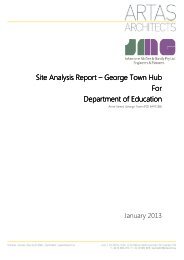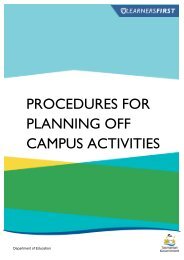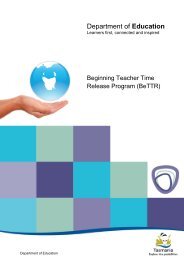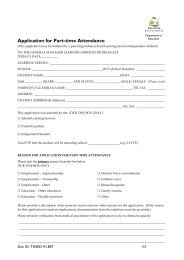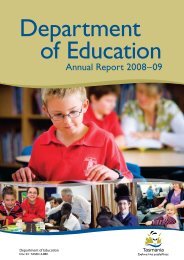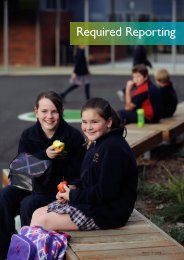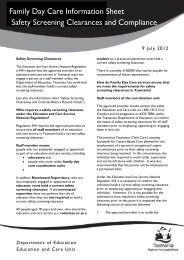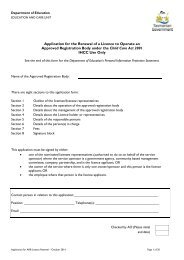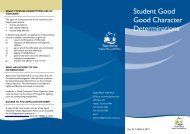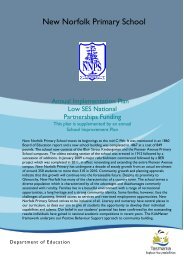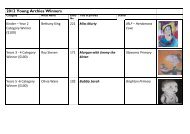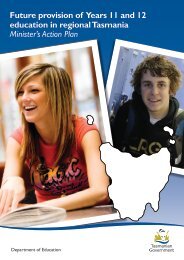Tas Curriculum K-10 - Languages - Italian - Department of Education
Tas Curriculum K-10 - Languages - Italian - Department of Education
Tas Curriculum K-10 - Languages - Italian - Department of Education
Create successful ePaper yourself
Turn your PDF publications into a flip-book with our unique Google optimized e-Paper software.
Numbers and time<br />
Fractions e.g. un quarto, metà<br />
Time expressions e.g. ieri sera, due giorni fa,<br />
lunedì scorso<br />
Decimals<br />
Collective numbers e.g. paio, coppia,<br />
decina, dozzina, centinaio, migliaio<br />
Prepositions<br />
Adverbial prepositions (preposizioni<br />
avverbiali) e.g. sopra, sotto, dentro, fuori,<br />
davanti a, dietro, dietro a<br />
Prepositional phrases indicating location e.g.<br />
vicino a, lontano da, di fronte a<br />
Common prepositional phrases e.g.<br />
parto per Milano, parto da Milano<br />
Special usage <strong>of</strong> da e.g. vengo da te, and<br />
in time expressions e.g. sono qui da un<br />
anno<br />
With verb e.g. commincio a leggere<br />
Pronouns<br />
Direct object pronouns: mi, ti, La, lo, la,<br />
li, le e.g. lo prendo, non lo mangio<br />
At the end <strong>of</strong> the infinitive e.g. dimmi,<br />
voglio mangiarla, vado a salutarla<br />
Interrogative e.g. chi? che (cosa)? quale?<br />
quanto? dove?<br />
Disjunctive pronouns e.g. a me, per te, con lui<br />
Object and reflexive pronouns used with the<br />
imperative e.g. alzati!, vestiti!, invitila!<br />
Indirect object pronouns - mi, ti, gli, le,<br />
ci, vi, gli, loro e.g. gli parliamo domani<br />
Reflexive pronouns e.g. ci vediamo, vi<br />
conoscete<br />
Sentence & phrase types<br />
Interchangeable questions and statements e.g.<br />
e.g Perchè va a Melbourne in nave? Perchè si<br />
traslocca<br />
Negative constructions e.g. non gioco più a<br />
tennis, non mangio mai il cioccolato, non ho piu<br />
soldi, non faccio niente<br />
Time phrases e.g. Sono qui da un’ora, ero lì<br />
per un’ora, saro lì in un ora<br />
Learning opportunities standard five<br />
• Provide examples for a class collection <strong>of</strong><br />
proverbs and colloquial sayings in Australian<br />
English and target language texts to show that<br />
language is not always literal and has embedded<br />
cultural aspects e.g. ‘flies like a bird’ or ‘it costs<br />
an arm and a leg’.<br />
• Have students identify a personal area <strong>of</strong><br />
difficulty in their language learning e.g.<br />
remembering vocabulary, verbs or listening<br />
comprehension. Then have them plan and<br />
implement a strategy for improvement.<br />
Evaluate and discuss effectiveness <strong>of</strong> strategy<br />
with the class.<br />
• Have students edit and pro<strong>of</strong> read their own<br />
and other’s writing, using strategies to identify<br />
and correct errors.<br />
64



